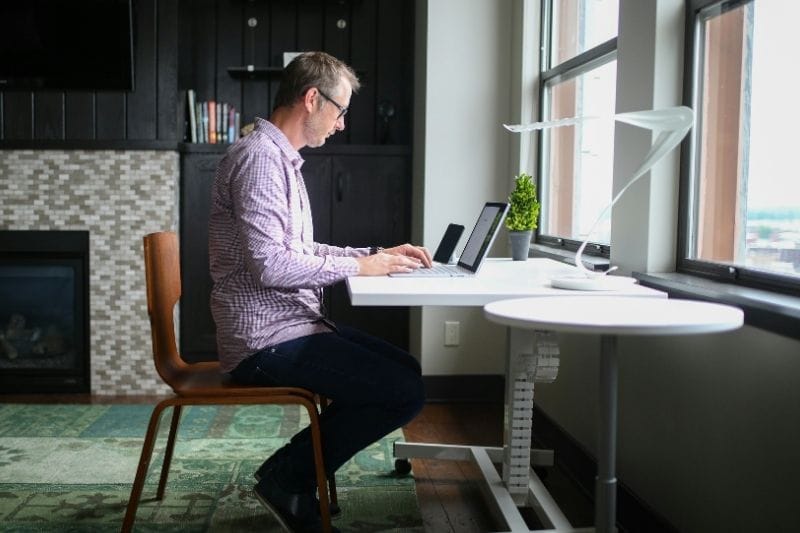Can you lose weight if you sit at a desk all day? Or does a nine to five job in front of a screen make it impossible to shift body fat? This is something that comes up with my online weight loss coaching clients really often, so you are not alone in facing this challenge.
The short answer is yes, you can lose weight with a desk job. Your body does not care whether you are in an office, at home, or on your feet in a warehouse. It responds to your overall energy balance, your movement and your habits. A desk job creates some extra challenges, but they are all fixable with a few simple changes to how you eat, move and structure your day.
In this blog I will look at why desk jobs make weight loss feel harder, the kind of movement that actually matters, and some easy habits you can build into a busy workday.
Why a desk job makes weight loss feel harder
A desk job on its own does not cause weight gain. However it changes your environment in ways that do not always help.
Most of the day is spent sitting, usually in front of a screen. That means you are not moving as much between tasks, so you burn fewer calories through natural movement. You step out of the door earlier, get home later, and often feel tired by the time work finishes. The last thing many people fancy at that point is a hard gym session.
The workplace itself can also be full of temptations. There might be a steady flow of biscuits, cakes, client lunches or vending machine trips. There is the stress of emails, deadlines and meetings, all of which nudge you towards quick sugar hits, creamy coffees and easy comfort food. Then there is the commute, which eats into the hours when you could have been walking, cooking or relaxing.
Working from home can create similar challenges, just in a different way. The kitchen is always nearby, so snacks are easier to grab. You might move even less because there is no walking between meeting rooms and no commute at all, so the day becomes long stretches of sitting. Home distractions, stress and back to back calls can also lead to grazing, comfort eating or relying on quick convenience food.
It is easy to see how all of this adds up. None of it says anything about your character or willpower. It simply means your default environment is pushing you towards eating more and moving less. So the aim is not to become a different person, it is to tilt the environment a little more in your favour.
How much movement do you actually need?
When people realise they sit all day, they often feel they need to make up for it with brutal gym sessions. In reality, small bits of movement spread through the day add up surprisingly well.
You do not need a magic step number, but most desk based clients do well with a target range, for example five to ten thousand steps on most days. If you are currently on three thousand, then five thousand is already an improvement. Think in terms of progress, not perfection. As I always say “perfect is the enemy of good”.
You can raise your daily movement through short “movement snacks”. Standing up every hour to walk to the kitchen, using the stairs instead of the lift, taking a loop round the building before you go back to your desk, walking to get a coffee instead of using the closest machine. None of these things feel like formal exercise, but they all raise your non exercise activity, which quietly increases how many calories you burn each day.
If you enjoy the gym, two or three short strength training sessions per week is enough for most people. These do not have to be long. A half hour session that you do regularly beats a ninety minute epic that you abandon after two weeks. If the gym feels like a big ask on workdays, it may suit you better to train once at the weekend and once midweek, or use home based strength sessions with dumbbells or bands.
Standing desks and clever chairs can be helpful if they encourage you to change position and fidget more. They are not magic for weight loss, though. If you like them, use them. If you do not, focus your effort on walking a bit more and breaking up long sitting periods.
Making your workday more weight loss friendly
You do not need a perfect routine to lose weight with a desk job. You just need a slightly better default pattern most of the time.
Food timing is often a big lever. Many people under eat early in the day, then arrive home absolutely starving. So breakfast becomes a key decision. Skipping it is not always a problem, but if you find yourself raiding the cupboards in the evening it may be worth eating a simple breakfast with some protein and fibre, for example yoghurt with fruit and oats or eggs on toast.
Lunch is your second anchor point. A lunch that is mostly beige carbs and very little protein tends to leave you hungry. A lunch that includes some lean protein, some veg or salad and a reasonable portion of carbohydrates is much more likely to keep you steady through the afternoon. Taking your own lunch in removes the guesswork and stops you being at the mercy of supermarket meal deals every day.
It can also help to plan a mid afternoon snack. Something like fruit and a yoghurt, some nuts with a piece of fruit, or a small wrap can be enough to take the edge off without blowing your calories. Having a planned snack is usually more effective than deciding that no snacks are allowed, then ending up at the biscuit tin anyway.
Hydration often gets overlooked. Keeping a bottle of water on your desk and sipping steadily through the day can reduce that fuzzy dehydrated feeling that many people mistake for tiredness or hunger. You do not need to drown yourself in water, but being reasonably topped up helps appetite, energy and focus.
Again, breaking up long sitting bouts also matters. It can be as simple as standing up every hour, walking to the furthest toilet, using a printer that is not right next to your desk, or taking work calls while standing or walking where appropriate. These are small shifts in how you live the day, not huge workouts.
Handling evenings when you are tired and hungry
For a lot of desk workers the main struggle is not the daytime, it is the evening. You get home tired, hungry and mentally done. The sofa, television, phone and food are all right there.
If you have under eaten earlier in the day, the drive to eat will be strong. If the day has been stressful, food will look like an easy way to self soothe. This combination leads many people to feel that they undo all their hard work in a short window between coming through the door and going to bed.
You can soften this pattern by working on both the day and the evening. Eating a little more earlier, especially protein and fibre, often takes the sharp edge off evening hunger. Having a simple go to evening meal that you can put together quickly reduces the risk of defaulting to a takeaway. It might not be the most exciting meal in the world, but if it is easy and filling you are more likely to use it regularly.
It also helps to create a short transition routine when you get home. Ten minutes to change clothes, sit quietly, walk round the block or have a shower can act as a buffer between work mode and home mode. Going straight from front door to fridge makes it very hard to break old habits.
When it might be time to ask for help
If you have tried to lose weight alongside a desk job several times and keep getting stuck, it is rarely because you are lazy or weak. It is usually because the plan you are following does not match your real life. You might be trying to do too much at once. You might be stuck in an all or nothing mindset. Or you might simply not be sure what matters most, so you use a lot of effort for very little payoff.
This is where working with a coach can make things easier. A good weight loss coach will help you design a plan that fits your actual work pattern, family life and energy levels. They can keep you accountable without judgement, help you handle busy weeks, and stop you from throwing the whole plan away after a few tricky days.
FAQs about desk jobs and weight loss
Can I really lose weight if I sit for eight hours a day?
Yes. Your total movement, food intake and habits over the week matter far more than the fact you sit while you work. Plenty of people with office jobs lose weight. You may need to be a bit more intentional with steps and food planning, but it is very doable.
Do I need a standing desk to lose weight?
No. Standing desks can help you move and fidget a little more, which is fine. They are not a requirement. If you enjoy using one and it makes you feel better, go ahead. If it feels like a gimmick, focus on regular walking and short breaks instead.
How many steps should I aim for with a desk job?
There is no magic number, but a range works well. Many people do well with five to ten thousand steps on most days. If you are far below that at the moment, aim to increase gradually. Even a couple of thousand extra steps a day can make a difference over time.
Is it bad if I can only exercise in the evenings?
No. Evening workouts are fine. The main thing is choosing a time that you can protect most weeks. If evenings are chaotic you might be better with short lunchtime walks or weekend sessions, but there is nothing wrong with training after work if that suits you. I train early in the morning as, for example, I know I won’t get pulled into work during that time so it means I get it done!
Why am I more hungry on work days?
Work days often involve longer gaps between meals, more stress, less sleep and more caffeine. All of these can increase hunger. If you tend to grab a quick breakfast and a rushed lunch, your body will try to catch up in the evening. Eating a little more earlier in the day, especially protein, can often reduce evening hunger.




